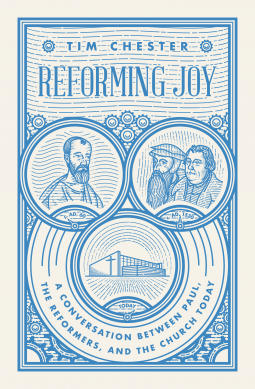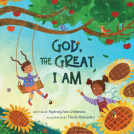
Reforming Joy
A Conversation between Paul, the Reformers, and the Church Today
by
This title was previously available on NetGalley and is now archived.
Send NetGalley books directly to your Kindle or Kindle app
1
To read on a Kindle or Kindle app, please add kindle@netgalley.com as an approved email address to receive files in your Amazon account. Click here for step-by-step instructions.
2
Also find your Kindle email address within your Amazon account, and enter it here.
Pub Date Sep 30 2018 | Archive Date Sep 05 2018
Talking about this book? Use #ReformingJoy #NetGalley. More hashtag tips!
Description
Exploring how the Reformation was a rediscovery of the themes in the book of Galatians, this book helps believers today discover the true freedom and lasting joy found in Jesus.
Exploring how the Reformation was a rediscovery of the themes in the book of Galatians, this book helps believers today discover the true freedom and lasting joy found in Jesus.
A Note From the Publisher
PDF may not be compatible with all reading devices
Advance Praise
“This concise and vigorous book commends gospel joy. It is also, fittingly, a joy to read. Each hard-hitting chapter engages our cultural moment, opens the biblical text, references Reformation wisdom, and points to God in Christ. This energetic manifesto will be of value for personal study, small-group discussion, and classroom reading at a beginning-college level.”
—Robert W. Yarbrough, Professor of New Testament, Covenant Theological Seminary
“I am thrilled that Tim Chester has addressed this neglected fruit of the Spirit. When the Reformation happened, it was, among other things, a rediscovery of true Christian joy. This joy had suffused the Christian world of the New Testament but throughout the medieval era had been largely forgotten as being central to the Christian life. Thus it is no wonder that when, in the eighteenth century, the Reformed author Andrew Fuller was seeking a revival among his fellow Baptists in England, he asked the ever-pertinent query, ‘Why is it that Christians in the present day come so far short of the primitive Christians in the possession of joy?’ He knew, as did the Reformers, and Paul before them all, that whenever a renewal or revival of the Christian faith takes place, joy will abound!”
—Michael A. G. Haykin, Professor of Church History and Biblical Spirituality, The Southern Baptist Theological Seminary; Director, Andrew Fuller Center for Baptist Studies
“Charles Spurgeon once told his congregation, ‘It is a great privilege to meet a truly happy man, a graciously happy man.’ Let it never be said that Reformed and joy are uneasy cohabitants in the heart of a Christian. Tim Chester’s work is a much-needed reminder for Reformed Christians that because we have been saved by grace alone, we of all people have reason to live out our days with deep exuberance over such a great salvation. In this volume, you will meet some truly happy men from the past—happy because they recovered a glorious gospel and happy because, in so doing, they restored to the church deep and lasting joy in Jesus. Read, remember, and rejoice! People of grace should be a graciously happy people.”
—Jeff Robinson Sr., Senior Editor, The Gospel Coalition; Pastor-Teacher, Christ Fellowship Church, Louisville, Kentucky
“Tim Chester has a well-earned reputation as a writer of clear, accessible, and helpful books for Christians. This is no exception. In a remarkably short space, he moves repeatedly from Luther to Galatia to Paul and to the present day, offering an account of numerous facets of the gospel, a plea for the Reformation understanding of faith and justification, and a vision of what the church is. And at every step of the way, he presses home the importance of joy as part of the content and the goal of the Christian life—though not joy as the world understands it but that which comes from knowing and resting on Christ. A great read!”
—Carl R. Trueman, Professor of Biblical and Religious Studies, Grove City College
“We live in a world that tells us to look within ourselves to find joy and lasting happiness. The problem is, looking within leaves us empty-handed, hopeless under the weight of our own unrighteousness. But Tim Chester has a message of remarkable hope. True joy is found in Christ and Christ alone. With help from the apostle Paul and the Protestant Reformers, Chester challenges the church today to return to the Scriptures, for they are the swaddling cloths of Christ. There we will hear the call from Christ himself to put aside our worthless merit and trust in him alone for a righteousness he alone can provide. Only then will we rediscover joy that will not disappoint.”
—Matthew Barrett, Associate Professor of Christian Theology, Midwestern Baptist Theological Seminary; editor, The Five Solas Series
“Tim Chester brings the core truths of the Reformation—‘by grace alone, through faith alone, in Christ alone’—to life. This is not a dry tour of history but rather an invitation to rediscover the joy that Paul unpacks in Galatians and that brought Luther to lead a gospel revolution 1,500 years later. If joy is not the first word that comes to your mind when you think about the Reformation, you need to read this book! You could read it in a day, but its impact will last long beyond that.”
—Jeremy McQuoid, Teaching Pastor, Deeside Christian Fellowship Church, Aberdeen, Scotland
Available Editions
| EDITION | Other Format |
| ISBN | 9781433558429 |
| PRICE | $14.99 (USD) |
Average rating from 9 members
Featured Reviews
 Sergiu P, Reviewer
Sergiu P, Reviewer
Good book. The author goes through the book of Galatians, exploring the themes of the book, applying the themes to our current situation, as well as including passages from the reformers at the end of each chapter which will enhance your understanding of theology.
The only thing that i'm not sure of is whether the author did a good enough job of linking everything well enough back to the theme of the book, which is Joy.
 Trevor K, Reviewer
Trevor K, Reviewer
I am thankful to net galley.com and Crossway for a review copy of this book.
Another book written to commemorate the reformation just what we need right? Well if thats all this book was then I would wholeheartedly agree, however this book is much more than just a book about the reformation. In that lies the great skill of the author.
Chester seamlessly blends together the world of first century Galatia, sixteenth century Europe and the modern world today and shows how each is relevant to the other. This book is well worth reading as a primer on the main points of the reformation, well worth reading as a primer in the study of the letter to the Galatians and well worth reading for the public engagement angles that if offers.
 Chris L, Reviewer
Chris L, Reviewer
The book of Galatians is one of my favorites in the Bible. Our church recently did a series in that book, which was all about grace. The book of Galatians is also about joy. Galatians 5 says that joy is part of the work of the Spirit in the life of the believe, which is called the fruit of the Spirit.
Tim Chester mentions that the book of Galatians was written to Christian who have lost their joy. He ties it to the same dilemma Christians were facing during the time of the Protestant Reformation. His latest book, Reforming Joy, serves as three way communication with the Apostle Paul, the Reformers, and the church today.
The book is not a lengthy book nor is it an extensive commentary on the book of Galatians. Chester addresses issues such as hearing God's voice, knowing God's approval, enjoying God's love, and knowing God's people, and doing the will of God. He looks at the time of the Reformation as they were dealing with these issues and what the book of Galatians addresses. Keep in mind, this is not a commentary of Galatians. Chester only goes through Galatians 1-5. Not sure why he did not go through Galatians 6.
As the 501st celebration of the Protestant Reformation is coming up, I think this book will be an excellent read as we get ready to celebrate this day in church history. It will also be a good addition to your study on the book of Galatians as well.
 Gregory K, Educator
Gregory K, Educator
Reforming Joy is a competent examination of Christian theological perspectives on religious joy. What is joy? What does it look like in action? What does it feel like inside? All these questions are rigorously viewed through multiple lenses.
But what I loved most about this book is the simple but ultimate conclusion that joy and kindness, fulfillment and compassion, happiness and empathy, are intimately related to each other. So be nice, God likes it and it feels good.
 Reviewer 438890
Reviewer 438890
In my opinion, this book was thematically disjointed. The author took the history of the Reformation, the core tenets of our faith, Paul's writing in Galatians and he attempted to tie it all into the theme of joy. He ultimately proves that Jesus is our greatest treasure and joy, yet the path he took to get to this conclusion, while completely true, did not seem to flow logically. I would probably recommend a different book on the topic of joy if I were recommending a resource to a friend. That being said, I am not sure I know of another book that attempts to look at the topic of joy and the Reformation at the same time. This book is a short read so if these themes interest you, it doesn't hurt to give it a try.
 Jeanie S, Reviewer
Jeanie S, Reviewer
The more we recognize God's goodness, the more we want to be good. The more we recognize our identity as God's children, the more we're free to serve others in love.
The text digs deep into the Luther's, Paul's and the Church's struggle with joy. We can get caught up in the legalism of Christianity or impressing others that we lose sight of the joy found in the goodness of God.
I appreciate the struggle of Luther's as he understood the grace of God. The justification of God and the sanctification of God. Without the proper understanding, we can be in great despair and lose faith. This text brings back the joy that despair easily overtakes. It's not the church that creates the gospel. It's the gospel that creates the church. Highly Recommend.
A Special Thank You to Crossway and Netgalley for the ARC and the opportunity to post an honest review
First sentence: This book is a three-way conversation. We’ll start in sixteenth-century Europe with the Reformation. We’ll travel back to first-century Galatia and the foundations of the Reformation in the message of Paul. And then we’ll come home and explore their relevance in the twenty-first century. It's going to be a conversation about joy.
Is Reforming Joy a commentary on Galatians? No. Yes. Maybe. It is a study of the book of Galatians. But it is not a verse-by-verse analysis of Paul's letter to the Galatians. It examines Galatians within the first-century context, the sixteenth-century context, and the twenty-first century context.
Did the Reformers "recover" the gospel? Did Luther grasp again what Paul's letter actually meant? How did his understanding of Paul change his life? change history? Does the book of Galatians--so incredibly powerful in Luther's day--still change lives? Do modern-day Christians take the gospel for granted? Do Christians read the book of Galatians and truly grasp how amazing, how wonderful, how transformative the gospel is? Have modern-day Christians lost sight of the gospel is--what it IS and what it ISN'T. Do we assume that all "gospel" messages proclaimed by teachers, preachers, evangelists are the same? Are we quick or slow in distinguishing between true and false gospels and true and false preachers? Do we need to be more discerning? If we were more discerning would we have more joy? Would we be better rooted in the faith?
The chapter titles:
How To Hear God's Voice: The Reforming Joy of Scripture Alone (Galatians 1)
How To Know God's Approval: The Reforming Joy of Faith Alone in Christ Alone (Galatians 2)
How To Recognize God's People: The Reforming Joy of Mother Church (Galatians 3-4)
How to Enjoy God's Love: The Reforming Joy of Adoption (Galatians 4)
How To Do God's Will: The Reforming Joy of Life in the Spirit (Galatians 5)
This book celebrates the gospel first and foremost. But it is also a celebration of the Reformation. I would definitely recommend this one! I would love to see other Christian books written with a "time machine" perspective. I'm sharing a few examples of this time machine approach:
"How do we know which is the true gospel? Where’s the true source of joy? We’ll address this issue by asking a series of connected questions. In Galatia one answer to the question of how we know what’s true was this: “You should submit to the founding church in Jerusalem.” People had come from Jerusalem telling the Gentiles (the non-Jews) that they needed to be circumcised. How do you know the true gospel? The Jerusalem church will tell you. Jump in our time machine, head to the sixteenth century, and we find the Catholic Church effectively giving the same answer. The only difference is that because the apostle Peter moved to Rome, it’s now the successor of Peter in Rome, the pope, who tells us what God wants. Fast forward to the twenty-first century, and we find a new variation on the answer. Today many people say, “I’ll follow the one I like best.” They say things like, “I’m not a Christian because I don’t like the idea of a god who sends people to hell.” That’s about as logical as saying, “I don’t believe in wearing a lifejacket because I don’t like the idea of drowning.” Nevertheless, people think they can determine what’s true on the basis of their preference, as if they construct reality through their decisions. It’s time to let the engine of the time machine cool down but not before we make the journey back to find Paul. He answers the question of how we can know what’s true in Galatians 1:11–12: “For I would have you know, brothers, that the gospel that was preached by me is not man’s gospel. For I did not receive it from any man, nor was I taught it, but I received it through a revelation of Jesus Christ.”"
and
"Is the Bible Enough? But who decides what the Scriptures say? That was the issue in the Reformation. The Catholic Church said that ordinary people weren’t sophisticated enough to read the Bible. They would only misunderstand it. “We’ll read the Bible for you,” they said, “and tell you what to believe.” It was the same issue in Galatia. The troublemakers weren’t saying, “Follow us instead of following the Bible.” They were saying, “You’ve misunderstood the Bible. Let us tell you what it really means. After all, we’re from the founding church of Jerusalem.” Paul’s response is to tell a lengthy two-part story. It’s a fascinating response. His job would have been so much easier if he had just said, “Actually, the leaders of the church in Jerusalem agree with me.” Because that was the case. But Paul doesn’t go straight from 1:12 to 2:9. Instead, he gives a lengthy travel itinerary in 1:13–2:10. He describes how he received his message directly from Christ (1:13–16) and didn’t even consult the apostles (1:16–24). If Paul had simply said, “The Jerusalem church agrees with me,” then he would have won one battle at the expense of another. He would have won the one over circumcision, but he would have conceded that Gentile Christians needed to obey the Jerusalem church rather than Scripture alone. He’s determined that we should realize that authority comes from God’s Word above all else. We’re not called to obey God’s Word plus a human institution or God’s Word interpreted by a human institution—not even the founding church in Jerusalem. So is the Bible enough? Yes. Our authority comes from Scripture alone. For us the challenge of Scripture alone comes primarily from the world around us... The challenge of Scripture alone is, Will we listen to God or to the world? But behind that is a bigger challenge: Do we live for God’s or other people’s approval? If the answer is other people’s, then we’ll inevitably end up compromising, neglecting, or reinterpreting the Bible to fit into the world around us. After all, no one wants to be thought of as a religious bigot or an outdated fool."
This would make an excellent discussion guide for a Bible study or conversation group. Broken into easily digestible chapters with reflection questions at the end of each. Chester's style is scholarly, with plenty of citations, but still approachable.
 JT T, Reviewer
JT T, Reviewer
I like to imagine what it would be like to have conversation with Paul when it comes to just everyday life. He is my hero and I love his passion for Jesus and his desire to make Jesus known. So anytime I spend time with Paul, I use his writings to imagine what it would be like for him to speak into my life around certain issues. Well, now I have a resource that helps with that endeavor in the works of Tim Chester. If you really want to lean into the topic of joy from one of the most historic figures ever, then this is the book for you. This is a great work.
Readers who liked this book also liked:
Julie Murphy; Sierra Simone
General Fiction (Adult), New Adult, Romance


















